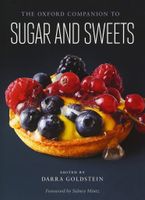Advertisement
Medieval and Early Modern Literature
Published 2015
Medieval Arabic literature, which, like ancient Indian literature, was written in the shadow of sugarcane, is positively obsessed with sweets and sweetness. In one tradition collected in the Ḥadīth, even the prophet Muhammad sighs over fālūdhaj, a dish made of wheat, honey, and clarified butter, though the meaning of that sigh was roundly debated. See islam; middle east; and persia. Several stories in 1001 Nights revolve around sweets, such as the battle between a husband and wife over a kunafāh (a fried pancake at that time) sweetened with cheap molasses instead of honey. Although satirists in every age use lowly food as a way of deflating noble abstractions and exposing pretensions, Arab satirists employ sweets with unusual abandon. The fifteenth-century satirical poet Ibn Sūdūn continually mentions bananas with honey and sugar syrup, about which he waxes, “My heart is madly in love since it misses you.”


